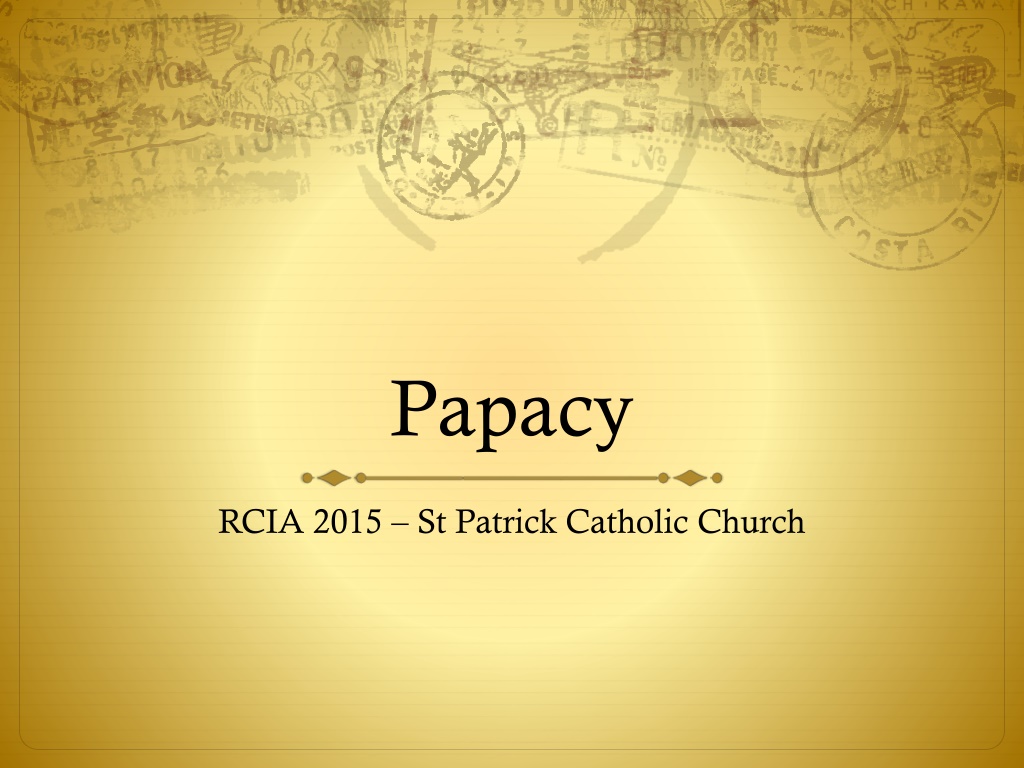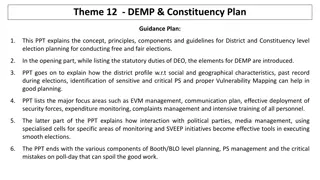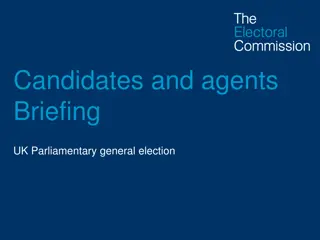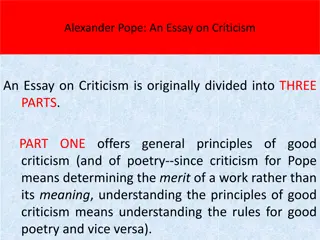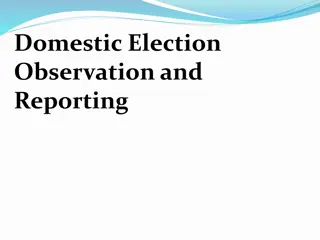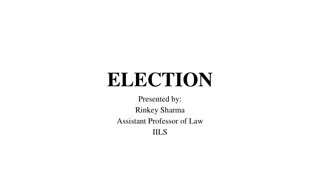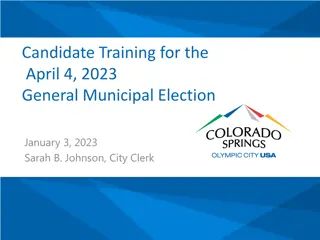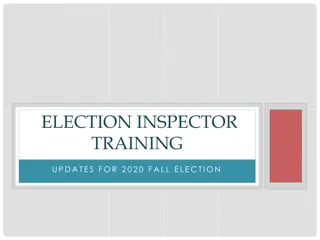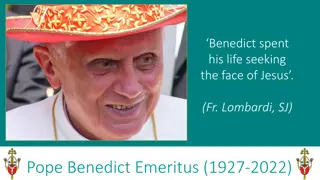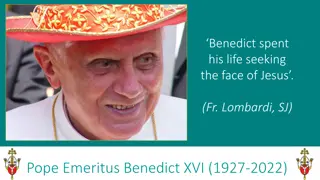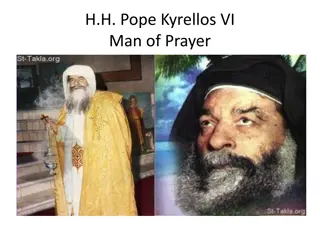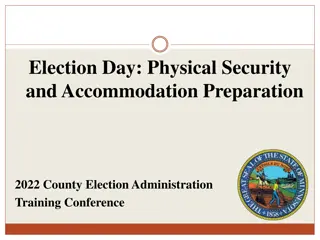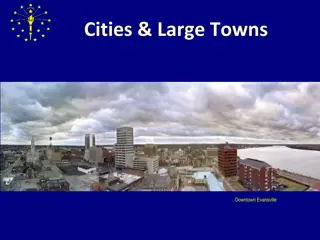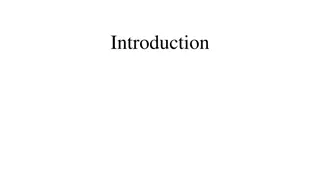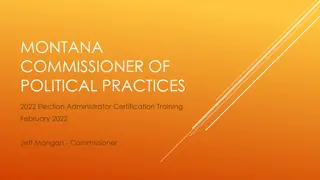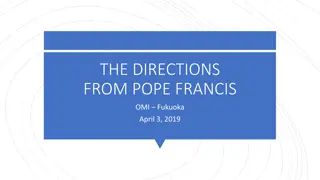Understanding the Papacy: Office of the Pope, Infallibility, and Election Process
Exploring the role of the Pope in the Catholic Church, this content delves into the Office of the Pope, the concept of Infallibility, and the process of electing a Pope through the College of Cardinals. It covers the historical significance, authority, and responsibilities associated with the papal office, shedding light on its roots in tradition and scripture.
Download Presentation

Please find below an Image/Link to download the presentation.
The content on the website is provided AS IS for your information and personal use only. It may not be sold, licensed, or shared on other websites without obtaining consent from the author. Download presentation by click this link. If you encounter any issues during the download, it is possible that the publisher has removed the file from their server.
E N D
Presentation Transcript
Papacy RCIA 2015 St Patrick Catholic Church
Agenda The office of the Pope How is the Pope elected? History of the Papacy it s long
Office of the Pope Head of the episcopal college of bishops First among equals Can act without the bishops, bishops need agreement from the Pope Binding and loosing responsibility given to Peter by Christ and passed on to his successors. (Mt 16:19) (ie. forgiveness of sins) Vicar of Christ, and pastor of the entire Church, has full, supreme, and universal power over the whole Church, a power which he can always exercise unhindered. The college bishops has no authority unless united with the Roman Pontiff, Peter s successor, as its head. The college has supreme and full authority over the universal Church; but this power cannot be exercised without the agreement of the Roman Pontiff.
Office of the Pope Magisterium Pope is the head The authority that lays down the authentic teachings of the Church Sacred Scripture Tradition Keeper of the Truth Responsible for preserving us from deviations and defections and to guarantee us an objective possibility of professing the true faith without error. Supreme pastor and teacher of all the faithful Confirms his brethren in the faith Proclaims by a definitive act a doctrine pertaining to faith or morals Infallibility promised to the Church is also present in the body of bishops
Office of the Pope Infallibility - Supreme apostolic authority concerning faith or morals Extraordinary Ex cathedra papal declaration Pius IX Immaculate Conception of Mary Pius XII Assumption of Mary Bishops in union with the Pope defining doctrine at General Council Ordinary Bishops outside of General Council if in union with the Pope Authoritative but Non Infallible Religious submission of intellect and will Pope and bishops when speaking or writing not outlined above
How is a Pope elected? College of Cardinals (at least for the last 900 years) Conclave called 15 to 20 days after death of Pope Limited to Cardinals younger than 80 on the day of current Pope s death Pope Paul VI limited the electors to 120 Pope elect must receive 2/3 of the votes if within the first 30 ballots after 30 ballots, if agreed, may be a majority Current Pope set rules for next election
History of the Papacy 266 popes have served the Church 32 popes were martyred by 655 AD 38 popes were from religious orders 18 were Benedictines 6 popes believed to be murdered Roman authority evolved from 30 to130 AD and established by ~195 AD with the Easter controversy by Pope Victor I Average service is 7 years 5 months
History of the Papacy Peter to Francis 1,982 years (33AD to 2015) St Peter was the first Pope and the only to use the name Peter Francis is the first Non-European Pope since Gregory III 731AD (Syria) From the Americas From Southern hemisphere From Jesuit order To choose the name Francis
History of the Papacy John II (533-535) was the first pope not using his personal name which was Mercury like the Rome god St Silverius (536-537) was the son of Pope St Hormisdas (514-523) St Martin I (649-655) last Pope recognized as a martyr St Sergius (687-701) introduced singing of the Lamb of God Stephen (896-897) tried Pope Formosus (891-896) after his death for illegally becoming pope during the Cadaver Synod (in between Stephen and Formosus was Pope Boniface VI who served 16 days St Gregory VII (1073-1085) restricted the title Papa to the Bishop of Rome Urban II (1088-1099) started the First Crusade.
History of the Papacy Honorius III (1216-1227) initiated the Fifth Crusade. Clement V (1305-1314) was Pope in Avignon, France Gregory XI (1370-1378) moved papal seat back to Rome Urban VIII (1623-1644) tried Galileo Galliei for heresy for supporting heliocentrism Pius IX (1846-78) called First Vatican Council which defined papal infallibility longest serving pope 31 years St John XXIII (1958-63) called the Second Vatican Council and intervened in the Cuban Missile Crisis St John Paul II (1978-2005) first non-Italian pope since Adrian VI (1522-1523), first Polish pope, founded World Youth Day
Catechism The episcopal college and its head, the Pope 880 When Christ instituted the Twelve, he constituted [them] in the form of a college or permanent assembly, at the head of which he placed Peter, chosen from among them. 398Just as by the Lord s institution, St. Peter and the rest of the apostles constitute a single apostolic college, so in like fashion the Roman Pontiff, Peter s successor, and the bishops, the successors of the apostles, are related with and united to one another. 399(552, 862) 881 The Lord made Simon alone, whom he named Peter, the rock of his Church. He gave him the keys of his Church and instituted him shepherd of the whole flock.400 The office of binding and loosing which was given to Peter was also assigned to the college of apostles united to its head. 401This pastoral office of Peter and the other apostles belongs to the Church s very foundation and is continued by the bishops under the primacy of the Pope. (553, 642)
Catechism The episcopal college and its head, the Pope 882 The Pope, Bishop of Rome and Peter s successor, is the perpetual and visible source and foundation of the unity both of the bishops and of the whole company of the faithful. 402 For the Roman Pontiff, by reason of his office as Vicar of Christ, and as pastor of the entire Church has full, supreme, and universal power over the whole Church, a power which he can always exercise unhindered. 403(834, 1369, 837) 883 The college or body of bishops has no authority unless united with the Roman Pontiff, Peter s successor, as its head. As such, this college has supreme and full authority over the universal Church; but this power cannot be exercised without the agreement of the Roman Pontiff. 404
Catechism The episcopal college and its head, the Pope 884 The college of bishops exercises power over the universal Church in a solemn manner in an ecumenical council. 405But there never is an ecumenical council which is not confirmed or at least recognized as such by Peter s successor. 406 885 This college, in so far as it is composed of many members, is the expression of the variety and universality of the People of God; and of the unity of the flock of Christ, in so far as it is assembled under one head. 407
Catechism The episcopal college and its head, the Pope 886 The individual bishops are the visible source and foundation of unity in their own particular Churches. 408As such, they exercise their pastoral office over the portion of the People of God assigned to them, 409assisted by priests and deacons. But, as a member of the episcopal college, each bishop shares in the concern for all the Churches.410The bishops exercise this care first by ruling well their own Churches as portions of the universal Church, and so contributing to the welfare of the whole Mystical Body, which, from another point of view, is a corporate body of Churches. 411They extend it especially to the poor,412to those persecuted for the faith, as well as to missionaries who are working throughout the world. (1560, 833, 2448) 887 Neighboring particular Churches who share the same culture form ecclesiastical provinces or larger groupings called patriarchates or regions.413The bishops of these groupings can meet in synods or provincial councils. In a like fashion, the episcopal conferences at the present time are in a position to contribute in many and fruitful ways to the concrete realization of the collegiate spirit. 414
Catechism The teaching office 85-87, 2032-2040 890 The mission of the Magisterium is linked to the definitive nature of the covenant established by God with his people in Christ. It is this Magisterium s task to preserve God s people from deviations and defections and to guarantee them the objective possibility of professing the true faith without error. Thus, the pastoral duty of the Magisterium is aimed at seeing to it that the People of God abides in the truth that liberates. To fulfill this service, Christ endowed the Church s shepherds with the charism of infallibility in matters of faith and morals. The exercise of this charism takes several forms: (851, 1785) 891 The Roman Pontiff, head of the college of bishops, enjoys this infallibility in virtue of his office, when, as supreme pastor and teacher of all the faithful who confirms his brethren in the faith he proclaims by a definitive act a doctrine pertaining to faith or morals.... The infallibility promised to the Church is also present in the body of bishops when, together with Peter s successor, they exercise the supreme Magisterium, above all in an Ecumenical Council.418When the Church through its supreme Magisterium proposes a doctrine for belief as being divinely revealed, 419and as the teaching of Christ, the definitions must be adhered to with the obedience of faith. 420This infallibility extends as far as the deposit of divine Revelation itself.421
